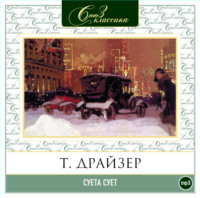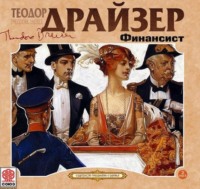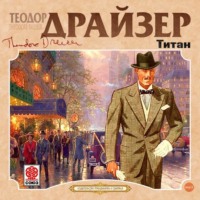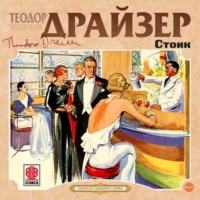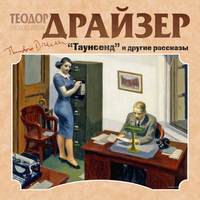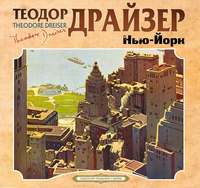
Полная версия
Titan / Титан. Книга для чтения на английском языке
At the same time it should be said, in the matter of women and the sex question, his judgment and views had begun to change tremendously. When he had first met Aileen he had many keen intuitions regarding life and sex, and above all clear faith that he had a right to do as he pleased. Since he had been out of prison and once more on his upward way there had been many a stray glance cast in his direction; he had so often had it clearly forced upon him that he was fascinating to women. Although he had only so recently acquired Aileen legally, yet she was years old to him as a mistress, and the first engrossing – it had been almost all-engrossing – enthusiasm was over. He loved her not only for her beauty, but for her faithful enthusiasm; but the power of others to provoke in him a momentary interest, and passion even, was something which he did not pretend to understand, explain, or moralize about. So it was and so he was. He did not want to hurt Aileen’s feelings by letting her know that his impulses thus wantonly strayed to others, but so it was. <…>
It was during this period of social dullness, however, which somewhat resembled, though it did not exactly parallel his first years with his first wife, that Cowperwood finally met a woman who was destined to leave a marked impression on his life. He could not soon forget her. Her name was Rita Sohlberg. She was the wife of Harold Sohlberg, a Danish violinist who was then living in Chicago, a very young man; but she was not a Dane, and he was by no means a remarkable violinist, though he had unquestionably the musical temperament. <…>
Rita Sohlberg was of the semi-phlegmatic type, soft, full-blooded, with a body that was going to be fat at forty, but which at present was deliciously alluring. Having soft, silky, light-brown hair, the color of light dust, and moist gray-blue eyes, with a fair skin and even, white teeth, she was flatteringly self-conscious of her charms. She pretended in a gay, childlike way to be unconscious of the thrill she sent through many susceptible males, and yet she knew well enough all the while what she was doing and how she was doing it; it pleased her so to do. She was conscious of the wonder of her smooth, soft arms and neck, the fullness and seductiveness of her body, the grace and perfection of her clothing, or, at least, the individuality and taste which she made them indicate. <…>
A part of the peculiarity of her state was that Sohlberg had begun to disappoint Rita – sorely. <…>
Life and character must really get somewhere to be admirable, and Harold, really and truly, did not seem to be getting anywhere. He taught, stormed, dreamed, wept; but he ate his three meals a day, Rita noticed, and he took an excited interest at times in other women. <…>
Rita was not jealous of Harold any more; she had lost faith in his ability as a musician. But she was disappointed that her charms were not sufficient to blind him to all others. That was the fly in the ointment[68]. It was an affront to her beauty, and she was still beautiful. She was unctuously full-bodied, not quite so tall as Aileen, not really as large, but rounder and plumper, softer and more seductive. Physically she was not well set up, so vigorous; but her eyes and mouth and the roving character of her mind held a strange lure. Mentally she was much more aware than Aileen, much more precise in her knowledge of art, music, literature, and current events; and in the field of romance she was much more vague and alluring. She knew many things about flowers, precious stones, insects, birds, characters in fiction, and poetic prose and verse generally.
At the time the Cowperwoods first met the Sohlbergs the latter still had their studio in the New Arts Building, and all was seemingly as serene as a May morning, only Harold was not getting along very well. He was drifting. The meeting was at a tea given by the Haatstaedts, with whom the Cowperwoods were still friendly, and Harold played. Aileen, who was there alone, seeing a chance to brighten her own life a little, invited the Sohlbergs, who seemed rather above the average, to her house to a musical evening. They came. <…>
Mrs. Sohlberg, he reflected shrewdly, had a kind of fool for a husband. Would she take an interest in him, Frank Cowperwood? Would a woman like this surrender on any basis outside of divorce and marriage? He wondered. On her part, Mrs. Sohlberg was thinking what a forceful man Cowperwood was, and how close he had stayed by her. She felt his interest, for she had often seen these symptoms in other men and knew what they meant. She knew the pull of her own beauty, and, while she heightened it as artfully as she dared, yet she kept aloof, too, feeling that she had never met anyone as yet for whom it was worth while to be different. But Cowperwood – he needed someone more soulful than Aileen, she thought.
Chapter XV
A New Affection
The growth of a relationship between Cowperwood and Rita Sohlberg was fostered quite accidentally by Aileen, who took a foolishly sentimental interest in Harold which yet was not based on anything of real meaning. She liked him because he was a superlatively gracious, flattering, emotional man where women – pretty women – were concerned. She had some idea she could send him pupils, and, anyhow, it was nice to call at the Sohlberg studio. Her social life was dull enough as it was. So she went, and Cowperwood, mindful of Mrs. Sohlberg, came also. Shrewd to the point of destruction, he encouraged Aileen in her interest in them. He suggested that she invite them to dinner, that they give a musical at which Sohlberg could play and be paid. There were boxes at the theaters, tickets for concerts sent, invitations to drive Sundays or other days.
The very chemistry of life seems to play into the hands of a situation of this kind. Once Cowperwood was thinking vividly, forcefully, of her, Rita began to think in like manner of him. Hourly he grew more attractive, a strange, gripping man. Beset by his mood, she was having the devil’s own time with her conscience. Not that anything had been said as yet, but he was investing her, gradually beleaguering her, sealing up, apparently, one avenue after another of escape. One Thursday afternoon, when neither Aileen nor he could attend the Sohlberg tea, Mrs. Sohlberg received a magnificent bunch of Jacqueminot roses[69]. “For your nooks and corners,” said a card. She knew well enough from whom it came and what it was worth. There were all of fifty dollars worth of roses. It gave her breath of a world of money that she had never known. Daily she saw the name of his banking and brokerage firm advertised in the papers. Once she met him in Merrill’s store at noon, and he invited her to lunch; but she felt obliged to decline. Always he looked at her with such straight, vigorous eyes. To think that her beauty had done or was doing this! Her mind, quite beyond herself, ran forward to an hour when perhaps this eager, magnetic man would take charge of her in a way never dreamed of by Harold. But she went on practising, shopping, calling, reading, brooding over Harold’s inefficiency, and stopping oddly sometimes to think – the etherealized grip of Cowperwood upon her. Those strong hands of his – how fine they were – and those large, soft-hard, incisive eyes. The puritanism of Wichita (modified sometime since by the art life of Chicago, such as it was) was having a severe struggle with the manipulative subtlety of the ages – represented in this man.
“You know you are very elusive,” he said to her one evening at the theater when he sat behind her during the entr’acte, and Harold and Aileen had gone to walk in the foyer. The hubbub of conversation drowned the sound of anything that might be said. Mrs. Sohlberg was particularly pleasing in a lacy evening gown.
“No,” she replied, amusedly, flattered by his attention and acutely conscious of his physical nearness. By degrees she had been yielding herself to his mood, thrilling at his every word. “It seems to me I am very stable,” she went on. “I’m certainly substantial enough.”
She looked at her full, smooth arm lying on her lap.
Cowperwood, who was feeling all the drag of her substantiality, but in addition the wonder of her temperament, which was so much richer than Aileen’s, was deeply moved. Those little blood moods that no words ever (or rarely) indicate were coming to him from her – faint zephyr-like emanations of emotions, moods, and fancies in her mind which allured him. She was like Aileen in animality, but better, still sweeter, more delicate, much richer spiritually. Or was he just tired of Aileen for the present, he asked himself at times. No, no, he told himself that could not be. Rita Sohlberg was by far the most pleasing woman he had ever known.
“Yes, but elusive, just the same,” he went on, leaning toward her. “You remind me of something that I can find no word for – a bit of color or a perfume or tone – a flash of something. I follow you in my thoughts all the time now. Your knowledge of art interests me. I like your playing – it is like you. You make me think of delightful things that have nothing to do with the ordinary run of my life. Do you understand?”
“It is very nice,” she said, “if I do.” She took a breath, softly, dramatically. “You make me think vain things, you know.” (Her mouth was a delicious O.) “You paint a pretty picture.” She was warm, flushed, suffused with a burst of her own temperament.
“You are like that,” he went on, insistently. “You make me feel like that all the time. You know,” he added, leaning over her chair, “I sometimes think you have never lived. There is so much that would complete your perfectness. I should like to send you abroad or take you – anyhow, you should go. You are very wonderful to me. Do you find me at all interesting to you?”
“Yes, but” – she paused – “you know I am afraid of all this and of you.” Her mouth had that same delicious formation which had first attracted him. “I don’t think we had better talk like this, do you? Harold is very jealous, or would be. What do you suppose Mrs. Cowperwood would think?”
“I know very well, but we needn’t stop to consider that now, need we? It will do her no harm to let me talk to you. Life is between individuals, Rita. You and I have very much in common. Don’t you see that? You are infinitely the most interesting woman I have ever known. You are bringing me something I have never known. Don’t you see that? I want you to tell me something truly. Look at me. You are not happy as you are, are you? Not perfectly happy?”
“No.” She smoothed her fan with her fingers.
“Are you happy at all?”
“I thought I was once. I’m not any more, I think.”
“It is so plain why,” he commented. “You are so much more wonderful than your place gives you scope for. You are an individual, not an acolyte to swing a censer for another. Mr. Sohlberg is very interesting, but you can’t be happy that way. It surprises me you haven’t seen it.”
“Oh,” she exclaimed, with a touch of weariness, “but perhaps I have.”
He looked at her keenly, and she thrilled. “I don’t think we’d better talk so here,” she replied. “You’d better be – ”
He laid his hand on the back of her chair, almost touching her shoulder.
“Rita,” he said, using her given name again, “you wonderful woman!”
“Oh!” she breathed.
Cowperwood did not see Mrs. Sohlberg again for over a week – ten days exactly – when one afternoon Aileen came for him in a new kind of trap, having stopped first to pick up the Sohlbergs. Harold was up in front with her and she had left a place behind for Cowperwood with Rita. She did not in the vaguest way suspect how interested he was – his manner was so deceptive. Aileen imagined that she was the superior woman of the two, the better-looking, the better-dressed, hence the more ensnaring. She could not guess what a lure this woman’s temperament had for Cowperwood, who was so brisk, dynamic, seemingly unromantic, but who, just the same, in his nature concealed (under a very forceful exterior) a deep underlying element of romance and fire.
“This is charming,” he said, sinking down beside Rita. “What a fine evening! And the nice straw hat with the roses, and the nice linen dress. My, my!”[70] The roses were red; the dress white, with thin, green ribbon run through it here and there. She was keenly aware of the reason for his enthusiasm. He was so different from Harold, so healthy and out-of-doorish, so able. To-day Harold had been in tantrums over fate, life, his lack of success.
“Oh, I shouldn’t complain so much if I were you,” she had said to him, bitterly. “You might work harder and storm less.”
This had produced a scene which she had escaped by going for a walk. Almost at the very moment when she had returned Aileen had appeared. It was a way out.
She had cheered up, and accepted, dressed. So had Sohlberg. Apparently smiling and happy, they had set out on the drive. Now, as Cowperwood spoke, she glanced about her contentedly. “I’m lovely,” she thought, “and he loves me. How wonderful it would be if we dared.” But she said aloud: “I’m not so very nice. It’s just the day – don’t you think so? It’s a simple dress. I’m not very happy, though, to-night, either.”
“What’s the matter?” he asked, cheeringly, the rumble of the traffic destroying the carrying-power of their voices. He leaned toward her, very anxious to solve any difficulty which might confront her, perfectly willing to ensnare her by kindness. “Isn’t there something I can do? We’re going now for a long ride to the pavilion in Jackson Park, and then, after dinner, we’ll come back by moonlight. Won’t that be nice? You must be smiling now and like yourself – happy. You have no reason to be otherwise that I know of. I will do anything for you that you want done – that can be done. You can have anything you want that I can give you. What is it? You know how much I think of you. If you leave your affairs to me you would never have any troubles of any kind.”
“Oh, it isn’t anything you can do – not now, anyhow. My affairs! Oh yes. What are they? Very simple, all.”
She had that delicious atmosphere of remoteness even from herself. He was enchanted.
“But you are not simple to me, Rita,” he said, softly, “nor are your affairs. They concern me very much. You are so important to me. I have told you that. Don’t you see how true it is? You are a strange complexity to me – wonderful. I’m mad over you. Ever since I saw you last I have been thinking, thinking. If you have troubles let me share them. You are so much to me – my only trouble. I can fix your life. Join it with mine. I need you, and you need me.”
“Yes,” she said, “I know.” Then she paused. “It’s nothing much,” she went on – “just a quarrel.”
“What over?”
“Over me, really.” The mouth was delicious. “I can’t swing the censer[71] always, as you say.” That thought of his had stuck. “It’s all right now, though. Isn’t the day lovely, be-yoot-i-ful!”
Cowperwood looked at her and shook his head. She was such a treasure – so inconsequential. Aileen, busy driving and talking, could not see or hear. She was interested in Sohlberg, and the southward crush of vehicles on Michigan Avenue was distracting her attention. As they drove swiftly past budding trees, kempt lawns, fresh-made flower-beds, open windows – the whole seductive world of spring – Cowperwood felt as though life had once more taken a fresh start. His magnetism, if it had been visible, would have enveloped him like a glittering aura. Mrs. Sohlberg felt that this was going to be a wonderful evening.
The dinner was at the Park – an open-air chicken à la Maryland affair, with waffles and champagne to help out. Aileen, flattered by Sohlberg’s gaiety under her spell, was having a delightful time, jesting, toasting, laughing, walking on the grass. Sohlberg was making love to her in a foolish, inconsequential way, as many men were inclined to do; but she was putting him off gaily with “silly boy” and “hush.” She was so sure of herself that she was free to tell Cowperwood afterward how emotional he was and how she had to laugh at him. Cowperwood, quite certain that she was faithful, took it all in good part. Sohlberg was such a dunce and such a happy convenience ready to his hand. “He’s not a bad sort,” he commented. “I rather like him, though I don’t think he’s so much of a violinist.”
After dinner they drove along the lake-shore and out through an open bit of tree-blocked prairie land, the moon shining in a clear sky, filling the fields and topping the lake with a silvery effulgence. Mrs. Sohlberg was being inoculated with the virus Cowperwood, and it was taking deadly effect. The tendency of her own disposition, however lethargic it might seem, once it was stirred emotionally, was to act. She was essentially dynamic and passionate. Cowperwood was beginning to stand out in her mind as the force that he was. It would be wonderful to be loved by such a man. There would be an eager, vivid life between them. It frightened and drew her like a blazing lamp in the dark. To get control of herself she talked of art, people, of Paris, Italy, and he responded in like strain, but all the while he smoothed her hand, and once, under the shadow of some trees, he put his hand to her hair, turned her face, and put his mouth softly to her cheek. She flushed, trembled, turned pale, in the grip of this strange storm, but drew herself together. It was wonderful – heaven. Her old life was obviously going to pieces.
“Listen,” he said, guardedly. “Will you meet me tomorrow at three just beyond the Rush Street bridge? I will pick you up promptly. You won’t have to wait a moment.”
She paused, meditating, dreaming, almost hypnotized by his strange world of fancy.
“Will you?” he asked, eagerly.
“Wait,” she said, softly. “Let me think. Can I?”
She paused.
“Yes,” she said, after a time, drawing in a deep breath. “Yes” – as if she had arranged something in her mind.
“My sweet,” he whispered, pressing her arm, while he looked at her profile in the moonlight.
“But I’m doing a great deal,” she replied, softly, a little breathless and a little pale.
Chapter XVI
A Fateful Interlude
Cowperwood was enchanted. He kept the proposed tryst with eagerness and found her all that he had hoped. She was sweeter, more colorful, more elusive than anybody he had ever known. In their charming apartment on the North Side which he at once engaged, and where he sometimes spent mornings, evenings, afternoons, as opportunity afforded, he studied her with the most critical eye and found her almost flawless. She had that boundless value which youth and a certain insouciance of manner contribute. There was, delicious to relate, no melancholy in her nature, but a kind of innate sufficiency which neither looked forward to nor back upon troublesome ills. She loved beautiful things, but was not extravagant; and what interested him and commanded his respect was that no urgings of his toward prodigality, however subtly advanced, could affect her. She knew what she wanted, spent carefully, bought tastefully, arrayed herself in ways which appealed to him as the flowers did. His feeling for her became at times so great that he wished, one might almost have said, to destroy it – to appease the urge and allay the pull in himself, but it was useless. The charm of her endured. His transports would leave her refreshed apparently, prettier, more graceful than ever, it seemed to him, putting back her ruffled hair with her hand, mouthing at herself prettily in the glass, thinking of many remote delicious things at once. <…>
For something over a year neither Sohlberg nor Aileen was aware of the intimacy which had sprung up. Sohlberg, easily bamboozled, went back to Denmark for a visit, then to study in Germany. Mrs. Sohlberg followed Cowperwood to Europe the following year. At Aix-les-Bains, Biarritz, Paris, even London, Aileen never knew that there was an additional figure in the background. Cowperwood was trained by Rita into a really finer point of view. He came to know better music, books, even the facts. She encouraged him in his idea of a representative collection of theold masters, and begged him to be cautious in his selection of moderns. He felt himself to be delightfully situated indeed.
The difficulty with this situation, as with all such where an individual ventures thus bucaneeringly on the sea of sex, is the possibility of those storms which result from misplaced confidence, and from our built-up system of ethics relating to property in women. To Cowperwood, however, who was a law unto himself, who knew no law except such as might be imposed upon him by his lack of ability to think, this possibility of entanglement, wrath, rage, pain, offered no particular obstacle. It was not at all certain that any such thing would follow. Where the average man might have found one such liaison difficult to manage, Cowperwood, as we have seen, had previously entered on several such affairs almost simultaneously; and now he had ventured on yet another; in the last instance with much greater feeling and enthusiasm. The previous affairs had been emotional makeshifts at best – more or less idle philanderings in which his deeper moods and feelings were not concerned. In the case of Mrs. Sohlberg all this was changed. For the present at least she was really all in all to him. But this temperamental characteristic of his relating to his love of women, his artistic if not emotional subjection to their beauty, and the mystery of their personalities led him into still a further affair, and this last was not so fortunate in its outcome.
Antoinette Nowak had come to him fresh from a West Side high school and a Chicago business college, and had been engaged as his private stenographer and secretary. This girl had blossomed forth into something exceptional, as American children of foreign parents are wont to do. You would have scarcely believed that she, with her fine, lithe body, her good taste in dress, her skill in stenography, bookkeeping, and business details, could be the daughter of a struggling Pole, who had first worked in the Southwest Chicago Steel Mills, and who had later kept a fifth-rate cigar, news, and stationery store in the Polish district, the merchandise of playing-cards and a back room for idling and casual gaming being the principal reasons for its existence. Antoinette, whose first name had not been Antoinette at all, but Minka (the Antoinette having been borrowed by her from an article in one of the Chicago Sunday papers), was a fine dark, brooding girl, ambitious and hopeful, who ten days after she had accepted her new place was admiring Cowperwood and following his every daring movement with almost excited interest. To be the wife of such a man, she thought – to even command his interest, let alone his affection – must be wonderful. After the dull world she had known – it seemed dull compared to the upper, rarefied realms which she was beginning to glimpse through him – and after the average men in the real-estate office over the way where she had first worked, Cowperwood, in his good clothes, his remote mood, his easy, commanding manner, touched the most ambitious chords of her being. One day she saw Aileen sweep in from her carriage, wearing warm brown furs, smart polished boots, a street-suit of corded brown wool, and a fur toque sharpened and emphasized by a long dark-red feather which shot upward like a dagger or a quill pen. Antoinette hated her. She conceived herself to be better, or as good at least. Why was life divided so unfairly? What sort of a man was Cowperwood, anyhow? <…>
Cowperwood, engrossed in his own plans, was not thinking of her at present. He was thinking of the next moves in his interesting gas war. And Aileen, seeing her one day, merely considered her an underling. The woman in business was such a novelty that as yet she was d,eclass,e. Aileen really thought nothing of Antoinette at all.
Somewhat over a year after Cowperwood had become intimate with Mrs. Sohlberg his rather practical business relations with Antoinette Nowak took on a more intimate color. What shall we say of this – that he had already wearied of Mrs. Sohlberg? Not in the least. He was desperately fond of her. Or that he despised Aileen, whom he was thus grossly deceiving? Not at all. She was to him at times as attractive as ever – perhaps more so for the reason that her self-imagined rights were being thus roughly infringed upon. He was sorry for her, but inclined to justify himself on the ground that these other relations – with possibly the exception of Mrs. Sohlherg – were not enduring. If it had been possible to marry Mrs. Sohlberg he might have done so, and he did speculate at times as to whether anything would ever induce Aileen to leave him; but this was more or less idle speculation. He rather fancied they would live out their days together, seeing that he was able thus easily to deceive her. But as for a girl like Antoinette Nowak, she figured in that braided symphony of mere sex attraction which somehow makes up that geometric formula of beauty which rules the world. She was charming in a dark way, beautiful, with eyes that burned with an unsatisfied fire; and Cowperwood, although at first only in the least moved by her, became by degrees interested in her, wondering at the amazing, transforming power of the American atmosphere.





